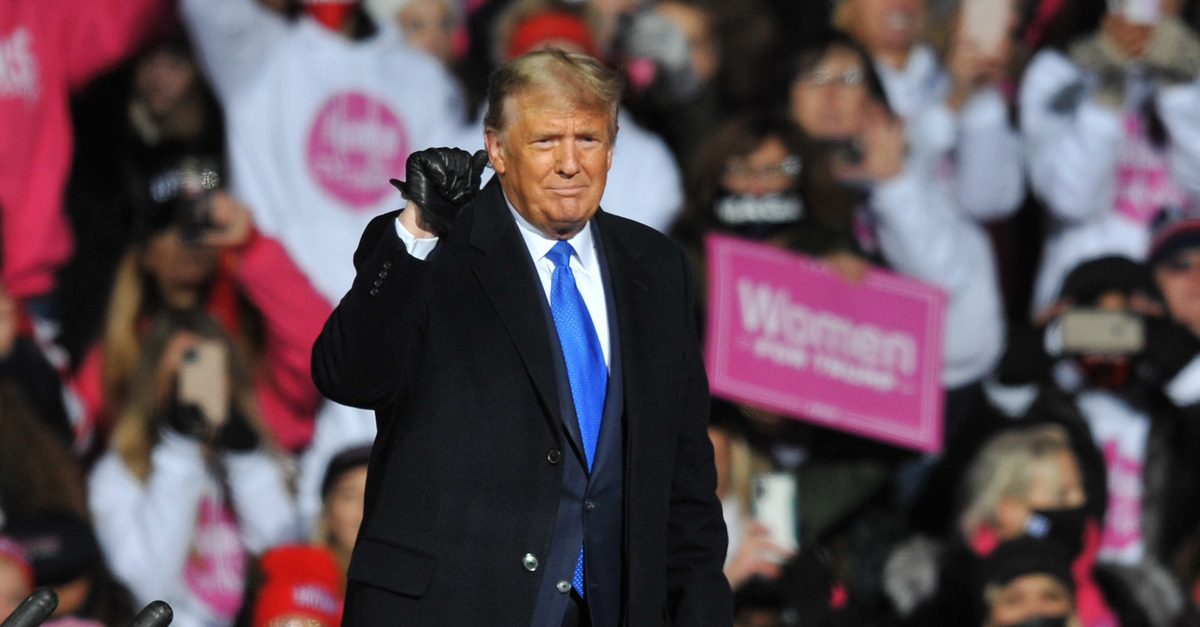
Conservatives floated fanciful and last-ditch theories as to how President Donald Trump could win certain states without actually winning the majority of the votes on Thursday.
One such theory was tweeted out in all caps by right-wing radio host Mark Levin and then retweeted by Donald Trump Jr.:
But Republican leadership in Pennsylvania, at least, previously put the kibosh on such ideas.
“Trump backers have urged state legislatures to take it upon themselves to appoint electors (disregarding vote results),” noted Tulane Law Professor Ross Garber. “This is a tweet from the Pennsylvania REPUBLICAN State Senate leader saying hell no.”
Appended to Garber’s tweet was a September statement from Keystone State Sen. Jake Corman, disputing a report in The Atlantic about the Trump 2020 campaign’s so-called “contingency plan” to eke out an electoral college victory by taking advantage of arguably constitutional loopholes in the anti-democratic system itself.
From that Barton Gellman story at length [emphasis added]:
We are accustomed to choosing electors by popular vote, but nothing in the Constitution says it has to be that way. Article II provides that each state shall appoint electors “in such Manner as the Legislature thereof may direct.” Since the late 19th century, every state has ceded the decision to its voters. Even so, the Supreme Court affirmed in Bush v. Gore that a state “can take back the power to appoint electors.” How and when a state might do so has not been tested for well over a century.Trump may test this. According to sources in the Republican Party at the state and national levels, the Trump campaign is discussing contingency plans to bypass election results and appoint loyal electors in battleground states where Republicans hold the legislative majority. With a justification based on claims of rampant fraud, Trump would ask state legislators to set aside the popular vote and exercise their power to choose a slate of electors directly. The longer Trump succeeds in keeping the vote count in doubt, the more pressure legislators will feel to act before the safe-harbor deadline expires.
“I have had ZERO contact with the Trump campaign or others about how PA chooses electors,” Corman tweeted at the time. “The [Pennsylvania] process as outlined in the Election Code DOES NOT involve the legislature.”
The slate of electors in Pennsylvania is governed by state election law and provides that names are provided–by the political parties–to the commonwealth’s secretary of state no later than 30 days following the presidential election.
Corman, however, reportedly told Gellman that “controversy” might force the legislature’s hand toward stepping in to fill vacancies as the electoral college deadline of December 8 approaches.
Law&Crime reached out to Corman’s office regarding the so-called “contingency plan” and whether he still stands by the statement but no response was forthcoming at the time of publication. Notably, the Republican leader still has the statement featured on his Twitter timeline as his pinned tweet.
Harvard Law Professor Lawrence Lessig also offered some cautionary advice to people like Levin and other members of the MAGA faithful pushing for the electoral college members to ignore their state’s popular vote totals.
“This might have been true before Chiafalo,” he tweeted. “But Chiafalo has changed this radically.”
The law professor was referring to the recent U.S. Supreme Court decision in the two cases rolled together and stylized as Chiafolo v. Washington.
In that opinion, the court unanimously held that states can punish faithless electors who vote against the popular vote winner or replace would-be faithless electors who telegraph a desire to diverge from the popular vote system. In theory, this means some states could effectively force or coerce hesitant electors to toe the line.
The opinion also had this to say [emphasis ours]:
Ratified at the start of the 19th century, the Twelfth Amendment both acknowledged and facilitated the Electoral College’s emergence as a mechanism not for deliberation but for party-line voting. Courts and commentators throughout that century recognized the presidential electors as merely acting on other people’s preferences.And state election laws evolved to reinforce that development, ensuring that a State’s electors would vote the same way as its citizens. Washington’s law is only another in the same vein. It reflects a longstanding tradition in which electors are not free agents; they are to vote for the candidate whom the State’s voters have chosen.
Justice Elena Kagan wrote the opinion of the court; Chief Justice John Roberts, and Justices Ruth Bader Ginsburg, Stephen Breyer, Samuel Alito, Sonia Sotomayor, Neil Gorsuch, Brett Kavanaugh joined it. Justice Clarence Thomas wrote an opinion concurring in the judgment, which Gorsuch also joined.
Pennsylvania, for its part, currently has no such laws and the Brookings Institution recently cited the Keystone Commonwealth as one state that might attempt to “subvert the electoral college” with faithless electors.
Earlier this year, Democrats in Pennsylvania pushed to pass a law that would punish or coerce would-be faithless electors. That effort never picked up any traction.
[image via Steve Pope/Getty Images]